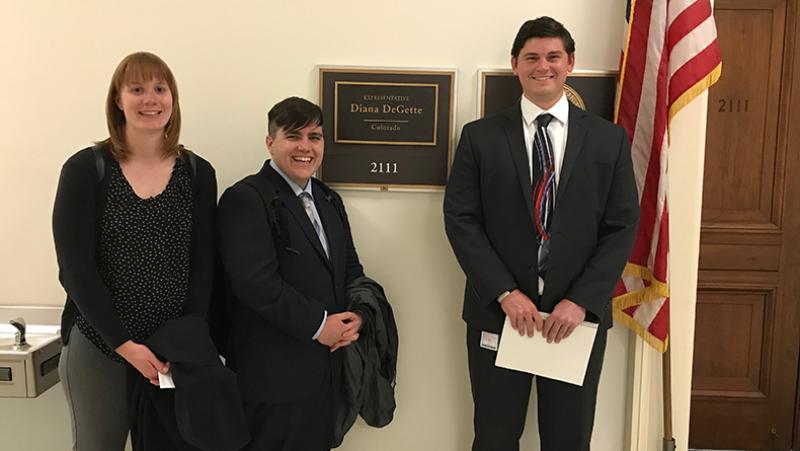Student Change Maker
MSW student Cullen Dilldine is engaging voters to create community change

Denver Campus MSW student Cullen Dilldine is serious about civic engagement.
In March, he and fellow student Beth Bernard traveled to Washington, DC, to represent the University of Denver Graduate School of Social Work (GSSW) at Social Work Day on Capitol Hill. Hosted by the Congressional Research Institute for Social Work and Policy, Dilldine met with staff from Colorado’s congressional delegation and advocated for an assault weapons ban and the Dream Act. In July, Dilldine partnered with New Era Colorado to host a voter registration drive at GSSW’s advanced-standing student orientation, followed by another at the foundation-year student orientation in September.
Approximately 50 people registered to vote at the two events — part of the National Social Work Voter Mobilization Campaign, which provides online resources to increase voter engagement.
“I wanted to welcome people but also to move voter and civic engagement issues to the forefront of how we think about social work,” says Dilldine, a second-year Organizational Leadership and Policy Practice student who works as an administrative and research assistant at the Burnes Center on Poverty and Homelessness and is completing a research fellowship at the Colorado Department of Human Services. “Voter engagement is fundamental to how we conceptualize community organization and community change. I wanted to get engaged and do my part of something I view to be really important. Social workers have a huge role to play in these large systems with complex, multifaceted interests.”
But not all students at the registration events viewed voting the same way, and Dilldine says that surprised him. He heard feedback such as “I don’t know what my vote does” and “I don’t want to be complicit in an unjust system” — responses that Dilldine says challenged him to think through why he feels voting is important, to develop a more authentic and non-shaming way of engaging people in conversations about voting, and to reflect on issues of power and privilege.
“Walking the walk and engaging with classmates is important. They share different perspectives of how to engage with the work — I learn so much from them,” says Dilldine.
It’s a learning experience he expects to carry forward in his school and professional career — he wants to work in policy research or advocacy to end homelessness and create more equitable community development. But first, he is planning some additional nonpartisan civic engagement activities for campus this fall.
“For people who are privileged, we need to engage to make change,” Dilldine adds. “Talking to people with a clip board isn’t my dream of a fun Saturday, but it’s important.”



